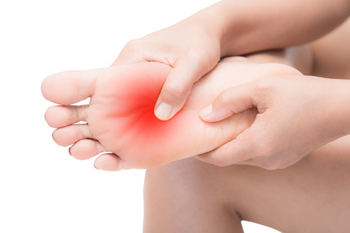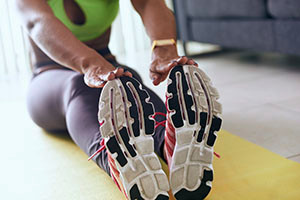Connect With Us
Blog
Items filtered by date: July 2021
Morton's Neuroma Treatments
 Morton’s neuroma is a condition in which a nerve in the ball of your foot is compressed as surrounding tissues thicken due to injury. Typically the nerve between the third and fourth toes is affected. This can lead to symptoms such as burning pain, tingling, and numbness in the ball of the foot, as well as the strange sensation that you are walking with a pebble in your shoe. Treatments for Morton’s neuroma vary based on the severity of the symptoms. Conservative treatments like footwear modifications and over the counter pain medications are often effective. In cases where conservative treatments fail, steroid injections directly into the foot or decompression surgery may help. For more information about Morton’s neuroma please consult with a podiatrist.
Morton’s neuroma is a condition in which a nerve in the ball of your foot is compressed as surrounding tissues thicken due to injury. Typically the nerve between the third and fourth toes is affected. This can lead to symptoms such as burning pain, tingling, and numbness in the ball of the foot, as well as the strange sensation that you are walking with a pebble in your shoe. Treatments for Morton’s neuroma vary based on the severity of the symptoms. Conservative treatments like footwear modifications and over the counter pain medications are often effective. In cases where conservative treatments fail, steroid injections directly into the foot or decompression surgery may help. For more information about Morton’s neuroma please consult with a podiatrist.
Morton’s neuroma is a very uncomfortable condition to live with. If you think you have Morton’s neuroma, contact Dr. Nicholas Przystawski of Central Florida Foot Care, PA. Our doctor will attend to all of your foot care needs and answer any of your related questions.
Morton’s Neuroma
Morton's neuroma is a painful foot condition that commonly affects the areas between the second and third or third and fourth toe, although other areas of the foot are also susceptible. Morton’s neuroma is caused by an inflamed nerve in the foot that is being squeezed and aggravated by surrounding bones.
What Increases the Chances of Having Morton’s Neuroma?
- Ill-fitting high heels or shoes that add pressure to the toe or foot
- Jogging, running or any sport that involves constant impact to the foot
- Flat feet, bunions, and any other foot deformities
Morton’s neuroma is a very treatable condition. Orthotics and shoe inserts can often be used to alleviate the pain on the forefront of the feet. In more severe cases, corticosteroids can also be prescribed. In order to figure out the best treatment for your neuroma, it’s recommended to seek the care of a podiatrist who can diagnose your condition and provide different treatment options.
If you have any questions, please feel free to contact our office located in Leesburg, FL . We offer the newest diagnostic and treatment technologies for all your foot care needs.
Read more about Morton's NeuromaHeel Pain May Indicate Plantar Fasciitis
 Heel pain is a common ailment among people who enjoy running. It may indicate a condition that is known as plantar fasciitis, which affects the heel and the arch of the foot. It occurs as a result of an inflammation of the plantar fascia, which is a portion of tissue that connects the heel to the toes. It is found on the bottom of the foot, and can cause severe pain and discomfort when it is inflamed. People who frequently participate in running and jumping activities may be prone to developing plantar fasciitis. Mild relief may be found when the affected foot is rested and elevated, and the activity that caused the condition is temporarily stopped. There are specific stretches that can be performed which may help to accelerate the healing process. If you have any type of heel pain, it is strongly suggested that you are under the care of a podiatrist who can effectively diagnose and treat plantar fasciitis.
Heel pain is a common ailment among people who enjoy running. It may indicate a condition that is known as plantar fasciitis, which affects the heel and the arch of the foot. It occurs as a result of an inflammation of the plantar fascia, which is a portion of tissue that connects the heel to the toes. It is found on the bottom of the foot, and can cause severe pain and discomfort when it is inflamed. People who frequently participate in running and jumping activities may be prone to developing plantar fasciitis. Mild relief may be found when the affected foot is rested and elevated, and the activity that caused the condition is temporarily stopped. There are specific stretches that can be performed which may help to accelerate the healing process. If you have any type of heel pain, it is strongly suggested that you are under the care of a podiatrist who can effectively diagnose and treat plantar fasciitis.
Plantar fasciitis is a common foot condition that is often caused by a strain injury. If you are experiencing heel pain or symptoms of plantar fasciitis, contact Dr. Nicholas Przystawski from Central Florida Foot Care, PA. Our doctor can provide the care you need to keep you pain-free and on your feet.
What Is Plantar Fasciitis?
Plantar fasciitis is one of the most common causes of heel pain. The plantar fascia is a ligament that connects your heel to the front of your foot. When this ligament becomes inflamed, plantar fasciitis is the result. If you have plantar fasciitis you will have a stabbing pain that usually occurs with your first steps in the morning. As the day progresses and you walk around more, this pain will start to disappear, but it will return after long periods of standing or sitting.
What Causes Plantar Fasciitis?
- Excessive running
- Having high arches in your feet
- Other foot issues such as flat feet
- Pregnancy (due to the sudden weight gain)
- Being on your feet very often
There are some risk factors that may make you more likely to develop plantar fasciitis compared to others. The condition most commonly affects adults between the ages of 40 and 60. It also tends to affect people who are obese because the extra pounds result in extra stress being placed on the plantar fascia.
Prevention
- Take good care of your feet – Wear shoes that have good arch support and heel cushioning.
- Maintain a healthy weight
- If you are a runner, alternate running with other sports that won’t cause heel pain
There are a variety of treatment options available for plantar fasciitis along with the pain that accompanies it. Additionally, physical therapy is a very important component in the treatment process. It is important that you meet with your podiatrist to determine which treatment option is best for you.
If you have any questions, please feel free to contact our office located in Leesburg, FL . We offer the newest diagnostic and treatment technologies for all your foot care needs.
Read more about Plantar Fasciitis
Arthritis Can Cause Pain in the Feet and Ankles
The Three Most Common Causes of Heel Pain
 Heel pain is one of the most frequent complaints addressed by podiatrists. While there can be many causes for heel pain, the three most common causes are plantar fasciitis, Achilles tendonitis, and blisters. Plantar fasciitis is an inflammation of the ligament that runs along the bottom of the foot. It is caused by repetitive overuse from running, standing for prolonged periods of time, or wearing ill-fitting and uncomfortable shoes. The heel pain from this condition is usually at its worst upon taking your first steps in the morning. Achilles tendonitis is an inflammation of the tendon that connects your calf muscles to your heel bone. Like plantar fasciitis, this condition is also caused by overexertion of the tendon during physical activities. Blisters are fluid-filled bubbles of skin that form over a concentrated area of the foot due to friction. They can be prevented by wearing shoes and socks that fit properly and do not rub excessively against the foot. If you are suffering from heel pain, please seek the care of a podiatrist.
Heel pain is one of the most frequent complaints addressed by podiatrists. While there can be many causes for heel pain, the three most common causes are plantar fasciitis, Achilles tendonitis, and blisters. Plantar fasciitis is an inflammation of the ligament that runs along the bottom of the foot. It is caused by repetitive overuse from running, standing for prolonged periods of time, or wearing ill-fitting and uncomfortable shoes. The heel pain from this condition is usually at its worst upon taking your first steps in the morning. Achilles tendonitis is an inflammation of the tendon that connects your calf muscles to your heel bone. Like plantar fasciitis, this condition is also caused by overexertion of the tendon during physical activities. Blisters are fluid-filled bubbles of skin that form over a concentrated area of the foot due to friction. They can be prevented by wearing shoes and socks that fit properly and do not rub excessively against the foot. If you are suffering from heel pain, please seek the care of a podiatrist.
Many people suffer from bouts of heel pain. For more information, contact Dr. Nicholas Przystawski of Central Florida Foot Care, PA. Our doctor can provide the care you need to keep you pain-free and on your feet.
Causes of Heel Pain
Heel pain is often associated with plantar fasciitis. The plantar fascia is a band of tissues that extends along the bottom of the foot. A rip or tear in this ligament can cause inflammation of the tissue.
Achilles tendonitis is another cause of heel pain. Inflammation of the Achilles tendon will cause pain from fractures and muscle tearing. Lack of flexibility is also another symptom.
Heel spurs are another cause of pain. When the tissues of the plantar fascia undergo a great deal of stress, it can lead to ligament separation from the heel bone, causing heel spurs.
Why Might Heel Pain Occur?
- Wearing ill-fitting shoes
- Wearing non-supportive shoes
- Weight change
- Excessive running
Treatments
Heel pain should be treated as soon as possible for immediate results. Keeping your feet in a stress-free environment will help. If you suffer from Achilles tendonitis or plantar fasciitis, applying ice will reduce the swelling. Stretching before an exercise like running will help the muscles. Using all these tips will help make heel pain a condition of the past.
If you have any questions please contact our office located in Leesburg, FL . We offer the newest diagnostic and treatment technologies for all your foot and ankle needs.
Read more about Heel PainMethods That Can Help to Prevent Running Injuries
 Many patients have chosen running during the recent lockdown to stay fit. People who frequently jog know the importance of warming up and cooling down, and this is beneficial in preventing running injuries. There are risk factors for incurring painful injuries, including being overweight, and wearing shoes that are outworn. Ankle sprains are a common foot injury and can possibly be avoided by properly stretching the tendons, muscles, and ligaments in the foot. Heel pain can develop for people who regularly run, and wearing the correct running shoes may help to alleviate this painful foot condition. If you would like additional information about how running injuries can affect the feet and how to prevent them, it is suggested that you consult with a podiatrist.
Many patients have chosen running during the recent lockdown to stay fit. People who frequently jog know the importance of warming up and cooling down, and this is beneficial in preventing running injuries. There are risk factors for incurring painful injuries, including being overweight, and wearing shoes that are outworn. Ankle sprains are a common foot injury and can possibly be avoided by properly stretching the tendons, muscles, and ligaments in the foot. Heel pain can develop for people who regularly run, and wearing the correct running shoes may help to alleviate this painful foot condition. If you would like additional information about how running injuries can affect the feet and how to prevent them, it is suggested that you consult with a podiatrist.
Exercising your feet regularly with the proper foot wear is a great way to prevent injuries. If you have any concerns about your feet, contact Dr. Nicholas Przystawski of Central Florida Foot Care, PA. Our doctor will treat your foot and ankle needs.
How to Prevent Running Injuries
Many common running injuries are caused by overuse and overtraining. When the back of the kneecap starts wearing out and starts causing pain in your knee, this is commonly referred to as runner’s knee. Runner’s knee is a decrease in strength in your quadriceps and can occur if you’re not wearing properly fitted or supporting shoes. To prevent runner’s knee, focusing on hip strengthening is a good idea, as well as strengthening your quads to keep the kneecaps aligned.
What Are Some Causes of Running Injuries?
- One cause of a common running injury is called iliotibial band syndrome.
- Plantar fasciitis is also another common injury.
- Stress fractures can occur from overtraining, lack of calcium, or even your running style.
Best Ways to Prevent Running Injuries
- Wear footwear that fits properly and suits your running needs.
- Running shoes are the only protective gear that runners have to safeguard them from injury.
- Make a training schedule. Adding strengthening exercises as well as regular stretching can help keep you strong and limber and can lessen the possibility of injuries.
- Stretching keeps muscles limber; this will help you gain better flexibility.
If you have any questions please feel free to contact our office located in Leesburg, FL . We offer the newest diagnostic and treatment technologies for all your foot and ankle needs.
Read more about How to Prevent Running Injuries
